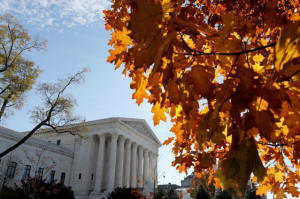|
U.S. top court takes up Republican
challenge to Maryland electoral district
 Send a link to a friend
Send a link to a friend
 [December 09, 2017]
By Lawrence Hurley [December 09, 2017]
By Lawrence Hurley
WASHINGTON (Reuters) - The U.S. Supreme
Court on Friday added a second case to its docket on a contentious issue
that could have major consequences for American elections, agreeing to
decide whether Democratic lawmakers in Maryland unlawfully drew a
congressional district in a way that would prevent a Republican
candidate from winning.
The court's agreement to take up an appeal by Republican voters in
Maryland regarding the U.S. House of Representatives district came two
months after the justices heard arguments in a high-profile challenge by
Democratic voters to Republican-drawn state legislative districts in
Wisconsin.
Both cases target a practice known as partisan gerrymandering that aims
to entrench one party in power and that critics have called a distortion
of the democratic process. The justices have not yet issued a ruling in
the Wisconsin case.

Each case presents a different legal theory as to why limits should be
placed on partisan gerrymandering, and the court's decision to take up a
second case on the issue hints that at least some of the nine justices
are seriously considering cracking down on it.
Gerrymandering, a practice dating back two centuries in American
politics, involves manipulating boundaries of legislative districts to
benefit one party and diminish another. Legislative districts around the
United States are redrawn every decade after the national census to
reflect population changes. The "redistricting" in most states is done
by the party in power though some states assign the task to independent
commissions.
The Supreme Court for decades has been willing to invalidate state
electoral maps on the grounds of racial discrimination but never those
drawn simply for partisan advantage.
In the Maryland case, the Republican voters targeting the
Democratic-drawn electoral map appealed a 2-1 ruling in August by a
panel of three federal judges sitting in Baltimore rejecting their
challenge.
Maryland's sixth congressional district, the focus of the case, was
previously held by a Republican and now is held by Democrat John
Delaney.
[to top of second column]
|

U.S. Supreme Court is seen in Washington, U.S., November 27, 2017.
REUTERS/Yuri Gripas

When the Supreme Court heard arguments in the Wisconsin case on Oct.
3, the justices appeared closely divided, with conservative Justice
Anthony Kennedy likely to cast the deciding vote.
The Republican challengers in Maryland take aim at a single
electoral district, not the whole state as in the Wisconsin case.
They argue that the district should be struck down because it was
drawn by Democrats as a form of retaliation on the basis of past
party affiliation based on the Constitution's guaranteed rights of
free association and free speech.
The challengers in the Wisconsin case argued that the Republican
electoral map violated Democratic voters' rights to equal protection
under the law as well as free speech and association.
In the Wisconsin case, the legal argument advanced by the Democratic
challengers was that an electoral map would be unlawful if the
intent was to discriminate against minority party voters, the map
had a sizable effect in accomplishing that goal and that there was
no other justification for the map.
The theory was based in part on measuring the number of "wasted"
votes in each district cast for a losing candidate and comparing
each party's total wasted votes on a statewide basis. The results,
plaintiffs said, show whether one party's votes are more likely to
be wasted than the other party's, which would show evidence of
unconstitutional extreme partisan gerrymandering.
(Reporting by Lawrence Hurley; Editing by Will Dunham)
[© 2017 Thomson Reuters. All rights
reserved.]
Copyright 2017 Reuters. All rights reserved. This material may not be published,
broadcast, rewritten or redistributed.
 |